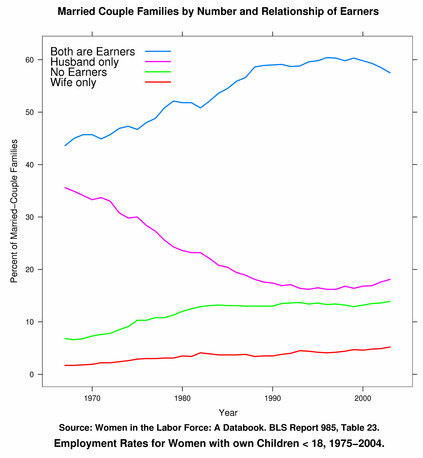Family Earnings by Gender
Many Ivy League women are joining what appears to be a trend: married women chosing to give up their careers to be full-time stay-at-home mothers.
Many Women at Elite Colleges Set Career Path to Motherhood (NYT, Sept. 20)
Many women at the nation’s most elite colleges say they have already decided that they will put aside their careers in favor of raising children. Though some of these students are not planning to have children and some hope to have a family and work full time, many others, like Ms. Liu, say they will happily play a traditional female role, with motherhood their main commitment.
Much attention has been focused on career women who leave the work force to rear children. What seems to be changing is that while many women in college two or three decades ago expected to have full-time careers, their daughters, while still in college, say they have already decided to suspend or end their careers when they have children. “At the height of the women’s movement and shortly thereafter, women were much more firm in their expectation that they could somehow combine full-time work with child rearing,” said Cynthia E. Russett, a professor of American history who has taught at Yale since 1967. “The women today are, in effect, turning realistic.” Dr. Russett is among more than a dozen faculty members and administrators at the most exclusive institutions who have been on campus for decades and who said in interviews that they had noticed the changing attitude.
[…]
While the changing attitudes are difficult to quantify, the shift emerges repeatedly in interviews with Ivy League students, including 138 freshman and senior females at Yale who replied to e-mail questions sent to members of two residential colleges over the last school year.
Kieran Healy decided that it wasn’t particularly difficult to quantify these things at all, and compiled the following chart using Bureau of Labor Statistics figures:

Kieran observes,
The timing of the declines in both dual-earner families and mothers̢۪ labor force participation look to me as though they are driven by sensitivity to prevailing labor market conditions rather than any widespread change in attitudes to work and motherhood. But what do I know?
It could well be, although we’d need more data to really have a clue. I agree, though, that anecdotal observations from a small survey of teenage Yale students is not the ideal basis for drawing large-scale generalizations.
One thing I find interesting about Kieran’s chart, though, is that there are–by far–more couples in which neither the husband nor the wife have a job than in which the wife has a job and the husband doesn’t. Whether this is a function of not bounding for age (the inclusion of retirees in the figures) or some commentary on gender roles, I don’t know.
I think that “giving up career” will be blurrier as years progress. So much work can be done by telecommuting that even stay-at-home moms can do some part-time duty and stay abreast of their industries/skill sets while still obviously focusing on their children’s upbringing.
hln